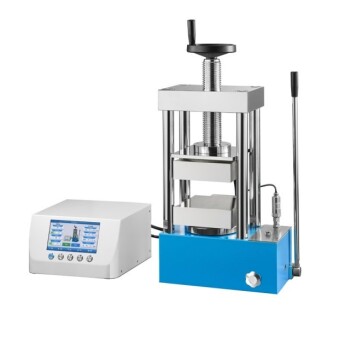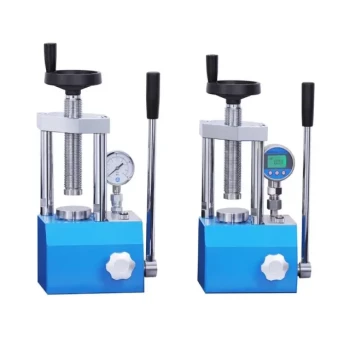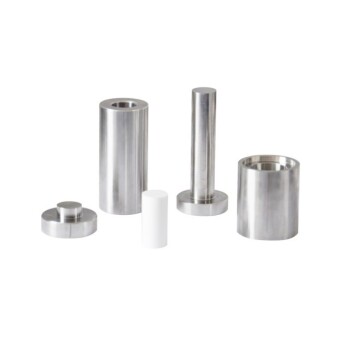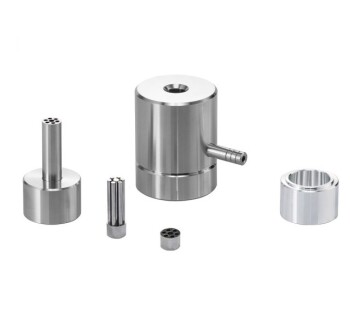Beyond their well-known role in rubber and plastics, laboratory presses are essential tools in a surprisingly diverse range of industries, including pharmaceuticals, aerospace, electronics, and even wood products. Their value lies in their ability to apply precise force and temperature in a controlled, repeatable manner, making them indispensable for everything from material development and quality control to small-scale production.
The true value of a laboratory press isn't tied to a single industry but to its core function: providing precise, repeatable control over pressure and temperature. This fundamental capability allows industries from aerospace to pharmaceuticals to develop new materials, test product durability, and ensure quality with confidence.

The Core Function: Precision Under Pressure
A laboratory press is fundamentally a tool for applying controlled force to a material sample. This simple function is critical for three primary tasks that span nearly every manufacturing and research sector.
Material Research and Development (R&D)
Scientists and engineers use presses to create and evaluate new materials. By applying specific levels of pressure and heat, they can form novel composites, polymers, ceramics, and alloys.
This process allows for rapid experimentation to discover materials with desired properties, such as enhanced strength, flexibility, or heat resistance.
Quality Control and Material Testing
In industries where material failure is not an option, presses are used for destructive and non-destructive testing. They verify that raw materials and finished components meet strict performance standards.
For example, a press can test the compressive strength of a concrete sample for the construction industry or the bond strength of a composite panel for an aerospace application.
Prototyping and Small-Scale Production
Before committing to expensive mass-production tooling, companies use laboratory presses to create functional prototypes and conduct short production runs.
This is common in the medical device, electronics, and automotive industries. It is also a cornerstone of lean manufacturing, where small, efficient production cells are preferred over large, inflexible assembly lines.
A Tour of Key Industries and Applications
By understanding the core functions, we can see how laboratory presses are deployed across various sectors.
Pharmaceuticals and Medical
Presses are used to compact powders into uniform tablets for dosage testing. They are also vital for testing the integrity of blister packs and developing medical-grade polymers and silicones for implants and devices.
Laminating and Electronics
Hot presses are critical for bonding multiple layers of material together. This is the process used to create credit cards, ID cards, and multi-layered printed circuit boards (PCBs) for computers and electronics.
Wood, Textiles, and Ceramics
In the wood industry, presses are used to test the bond strength of adhesives in plywood and engineered lumber. In textiles, they can compress fibers for testing, while in ceramics, they are used to form powdered materials into dense shapes before firing.
Aerospace and Automotive
These high-stakes industries rely on presses to test the durability and performance of advanced materials like carbon fiber composites and high-strength alloys under extreme force. Every component must be validated to ensure safety and reliability.
Understanding the Trade-offs
Not all presses are the same. The choice depends entirely on the specific application, balancing cost, precision, and throughput.
Manual vs. Automated Presses
A manual hand press is cost-effective, compact, and simple to operate, making it ideal for educational settings or labs with occasional testing needs.
An automated hydraulic press offers superior force, precision, and repeatability, making it the standard for industrial R&D, rigorous quality control, and short production runs.
Hot Press vs. Cold Press
A hot press integrates heating elements (platens) to apply both heat and pressure simultaneously. This is essential for molding, curing, and bonding polymers, laminates, and composites.
A cold press is used for applications where only pressure is needed, such as simple compaction, strength testing, or assembly.
The Limits of a Laboratory Press
It is crucial to recognize that laboratory presses are designed for precision and versatility, not mass production. Their cycle times are intentionally slow to ensure control, making them unsuitable for high-volume manufacturing lines.
Making the Right Choice for Your Goal
To select the appropriate equipment, you must first define your primary objective.
- If your primary focus is material discovery and R&D: You need a versatile press with precise digital control over both temperature and pressure for maximum experimentation.
- If your primary focus is quality control and strength testing: A durable hydraulic press with an accurate, calibrated pressure gauge is essential for repeatable, standardized tests.
- If your primary focus is small-scale prototyping or educational use: A cost-effective manual or benchtop press offers the best balance of performance, safety, and accessibility.
Ultimately, selecting the right press comes from clearly defining the specific task it needs to accomplish within your workflow.
Summary Table:
| Industry | Key Applications |
|---|---|
| Pharmaceuticals | Tablet compaction, blister pack testing, medical polymer development |
| Aerospace | Material durability testing, composite validation |
| Electronics | PCB lamination, credit card bonding |
| Wood & Ceramics | Adhesive strength testing, material forming |
| Automotive | Prototyping, component testing |
Ready to enhance your lab's capabilities with a precision laboratory press? KINTEK specializes in lab press machines, including automatic, isostatic, and heated models, designed to meet the needs of industries like pharmaceuticals, aerospace, and electronics. We provide reliable solutions for material R&D, quality control, and prototyping, ensuring accurate and repeatable results. Contact us today to discuss how our presses can drive your innovation and efficiency forward!
Visual Guide

Related Products
- Laboratory Hydraulic Press Lab Pellet Press Button Battery Press
- Automatic Laboratory Hydraulic Press Lab Pellet Press Machine
- 24T 30T 60T Heated Hydraulic Lab Press Machine with Hot Plates for Laboratory
- Manual Laboratory Hydraulic Pellet Press Lab Hydraulic Press
- Manual Heated Hydraulic Lab Press with Integrated Hot Plates Hydraulic Press Machine
People Also Ask
- Why use a laboratory hydraulic press with vacuum for KBr pellets? Enhancing Carbonate FTIR Precision
- What is the role of a laboratory hydraulic press in FTIR characterization of silver nanoparticles?
- What is the significance of uniaxial pressure control for bismuth-based solid electrolyte pellets? Boost Lab Accuracy
- Why is a laboratory hydraulic press used for FTIR of ZnONPs? Achieve Perfect Optical Transparency
- What is the role of a laboratory hydraulic press in LLZTO@LPO pellet preparation? Achieve High Ionic Conductivity



















